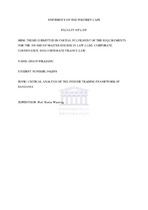| dc.description.abstract | This study is on the insider trading framework of Tanzania. The researcher has made enquiries whether the Tanzania legal framework governing insider trading provides strong enough enforcement mechanisms, including remedies and measures against malpractices found on the securities market to attract investor confidence. Critical analysis is done of the Capital Markets and Securities Act, 79 of 1994 (RE 2002) in conjunction with an investigation into the Capital Markets and Securities Authority (CMSA) a body corporate charged with the duties among others, of protecting the integrity of the securities market and maintaining surveillance over securities to ensure orderly, fair and equitable dealings in securities. The researcher uses a comparative approach from other jurisdictions considered as international best standards of the English and South African insider trading legislation. Discussions on the study are presented in chapters. Chapter one is the general introduction to the Study. It is the reproduction of the research
proposal. Chapter Two is on the overview of insider trading framework of Tanzania. An analysis is made on the provisions of the Capital Market and Securities Act, 79 of 1994 (RE 2002). It is revealed that the enforcement mechanisms are inadequate and ineffective. The Capital Market and Securities Act, 79 of 1994, (RE 2002) neither defines nor provides the interpretation to legal concepts such as insider, inside information and publication. Civil remedies and criminal penalties provided in the Tanzania Capital Market and Securities Act,
79 of 1994, (RE 2002) are inadequate for deterrent purposes to combat insider trading practices. In chapter three the researcher examines the Capital Market and Securities Authority (CMSA) in terms of fulfillments of its roles, functions, and powers. It is submitted that the CMSA and the DSE have never contributed much to resolving the problem of securities market abuses. Chapter four extend the study to the English and South Africa insider trading legislation considered as international best practice and therefore comparable. The researcher has observed that flaws in areas of prohibition, enforcements, defences and the lacuna on
identified concepts of insider trading make the Tanzanian insider trading legislation remain more symbolic than real in terms of its efficiency to combating insider trading practices. Chapter five provides the conclusions and recommendations on the study. The researcher has provided recommendations on curbing the problem of insider trading in Tanzania, including repealing and enacting a new strong and effective insider trading legislation. | en_US |

